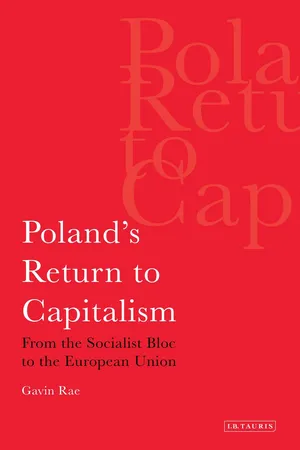
- 256 pages
- English
- PDF
- Available on iOS & Android
About This Book
PLEASE NOTE THIS IS AN NJR AND BLURB SHOULD NOT BE USED IN ITS RAW FORM:
This book considers the social, economic and political consequences of Poland's transition from socialism to capitalism. The immense changes that have occurred in the country over the past decade and a half are analysed in their historical and geo-political framework. Poland was the first Eastern European country to return to capitalism, with its shock-therapy economic reforms replicated throughout the region. These sought to dismantle the socialist elements of the economy as rapidly as possible and open up the post-socialist countries to the world capitalist market. The former socialist countries were absorbed into the international division of labour and their economies quickly became a part of and dependent upon the global capitalist system. The revolutions of 1989-91 not only transformed Eastern Europe but instigated fundamental changes to the international capitalist system itself. By opening up the ex-socialist economies to international capital a new era of globalisation was opened, as the principles and practices of neo-liberalism gained ascendancy. While a section of society prospered from this opening, other social groups saw their living-standards decline, creating large social inequalities. One consequence of these social divisions has been the destabilising of the newly created democratic political systems. The growth of more authoritarian, conservative political currents in Poland is an example of this. As the largest and most strategically important country in Central-Eastern Europe, Poland has increasingly become a focus of international relations between the major powers. Events in Poland, especially after European expansion, influence relations between the USA, the European Union and Russia. This book therefore looks both at how the absorption of Poland into the international capitalist system has transformed the country and at how this process is contributing to developments globally. It finishes by considering developments since EU Accession and at the expected results of this expansion both within Poland and an enlarged EU.
Frequently asked questions
Information
Table of contents
- Cover
- Contents
- List of Tables
- Acknowledgements
- Introduction
- 1. The Politics of Transition
- 2. Poland and the Under-Development of Eastern Europe
- 3. The Socio-Economic Effects of the Transition to Capitalism
- 5. From Stalinism to Social Democracy
- 6. Beyond European Union Accession
- Conclusions
- Appendix One
- Appendix Two
- Notes
- Bibliography
- Index